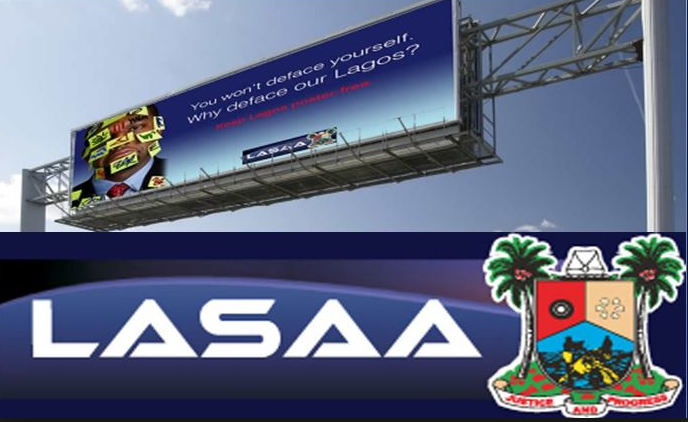• Lagos houses 4,284 billboards, 146 OOH agencies
• Landlords earn N1.87b
Out-of-home (OOH) advertising in Lagos is worth N50.29 billion, according to the state’s Signage and Advertisement Agency (LASAA) Managing Director, George Noah.
The segments include outdoor media buying (N8.6 billion), fabricators (N1.5 billion), installers (N382 million), outdoor specialist agencies (N 21.92 billion), large format printers (N8.275 billion), landlords (N1.875 billion), outdoor protection services (N307 million), mobile advertisers (N1.25 billion) and others (N8 billion).
Noah disclosed the figures at the Africa outdoor advertising conference and exhibition in Lagos, where he said outdoor hoardings have been brought under check as the number of hoardings is now put at 4,284 owned by 146 registered agencies.
The current OOH structures in the state are 16 sheet (1), 48 sheet (98), ultra wave- 33, rooftop (65), wall drapes (23), letter bins (29), temporary wall drapes (26), building branding (81), street furniture (cubes, miniature square backlit, under 10sqm) (1,796), sheet (35), LED (24), gantry (77), unipole (69), parasols (3,645) and kiosks (61).
Changes in outdoor advertising
Outdoor advertising has changed since the turn of the century. There is a lot of new thinking which has improved appreciation of the medium. Technology particularly has driven the sector to the next level.
For instance, 16 sheet and 48 sheet hoardings were commonplace before LASAA was established. The 16 sheet now has only one hoarding and 48 sheet has 98.
Technology has thrown up rooftop, wall drapes, ultra wave, unipole, backlits and LED hoardings, which have also meant more investment.
Challenges
Noah cautioned that despite the achievements in the outdoor sector, the industry is still bedeviled with challenges, including loss of market share to television, radio, press, social media and the internet.
Also posing headache are a lack of data, suspicion among stakeholders, illegal outdoor operators (posters), jurisdictional issues, OOH security providers, image of OOH, short term versus long term contractors.
Outdoor Advertising Association of Nigeria (OAAN) President, who is also West Africa Federation of Out-Of-Home Advertising President, Charles Chijide, said the science of connecting brands with the mobile audience has evolved in stages over the years, which involves constantly challenging innovative thinking.
“Practitioners have had to continually seek better ways of actualising set objectives for brands and corporate bodies.
“The considerations include changes in architecture, urban planning and development, changes in life-style, technological advancement, political evolution, business practices and law,” Chijide added.
Variations across Africa
All of these considerations are manifest in the common challenges facing the industry in Africa. Variations on the continent are only in terms of experience or manifestation.
While alcohol advertising on OOH media in Gambia is not regulated, Nigeria does not permit its exposure on hoardings close to schools, places of worship and hospitals.
Restrictive as this regulation could be to the Gambian practitioner, the rationale for it may one day dawn on regulators in that country to adopt the Nigerian approach, said Chijide.
“The issues confronting this practice in Africa are enormous and threatening. I will like to list them as follows: taxation and fees, laws and regulation, and clients’ relationship management, and issues of human resource – quality and engagement,” he added.
“We need to keep up the constant in clients’ needs and expectations vis-a-vis technological advancement.
“We appreciate all of those corporate bodies that have invested in human resource development through training and retraining, but I like to state that for us to be relevant and competitive, all OOH practitioners in Africa must see human capital investment as constant engagement.”
Heavy tax burden
Chijide noted that taxation across Africa is a heavy burden on businesses, especially outdoor advertising.
“Within the context of urban planning and environmental development, so many direct levies are on operators. When clutter was to be addressed in Nigeria, over half of businesses went down – in volume and value terms.
“That should put in clear perspective the impact such regulations have on our businesses. If we the practitioners had been taken as partners little could have been felt.”
It becomes much more worrisome when tax regimes are poorly regulated, resulting in multiple taxation, Chijide stressed.
Many outdoor advertising practitioners in Nigeria find it difficult to break even as a result of multiple taxation. It is from little rental, rate, touts, levies and taxes are paid to councils, state government agencies, and federal agencies, he said.
Besides, various government institutions and agencies make regulations that are unfriendly to outdoor advertising practice in Africa.
While in Nigeria the influence of these agencies are more direct and influential as a result of the huge population and political involvement.
Other countries not so large are indirectly influenced by global and regional agencies with economic power to influence the central government to take decisions that have adverse effects on outdoor advertising, without proper liaison or consultation with professional bodies.
An example is the influence of the collaboration of the World Health Organisation (WHO) with Ministries of Health in West African countries to regulate the advertising and exposure of alcohol and tobacco brands.
Such interventions are rationalised by studies on the health implication of such products.
Inconsistent enforcement of rules by regulators disadvantage media owners who play by the rules and prevents long term security in the market.
An example of this is in Uganda where the Kampala City Council has announced intent to create wholesale changes in the outdoor space bus has been slow to move. The result is reluctance from clients to invest in OOH locally, meaning media owners are sitting with vacant sites.
The recent challenge in Ghana is that of poor fabrication of metal display boards and its impact on urban beautification and danger to the public.
Municipal councils in Accra are stepping in to administer some form of regulation.
Stakeholders’ task
Noah said stakeholders should rebrand the sector, form a joint industry group, conduct audience research, exchange ideas with counterparts outside Nigeria, augment profile of OOH in schools, and encourage new thinking and innovation.











